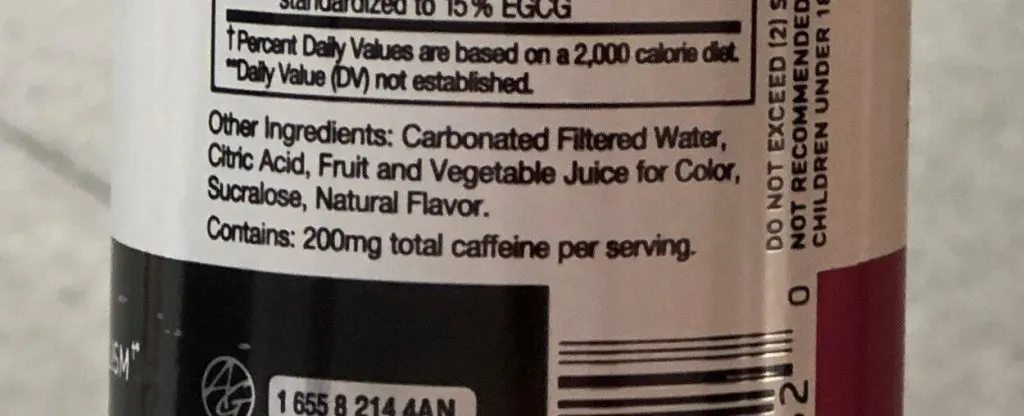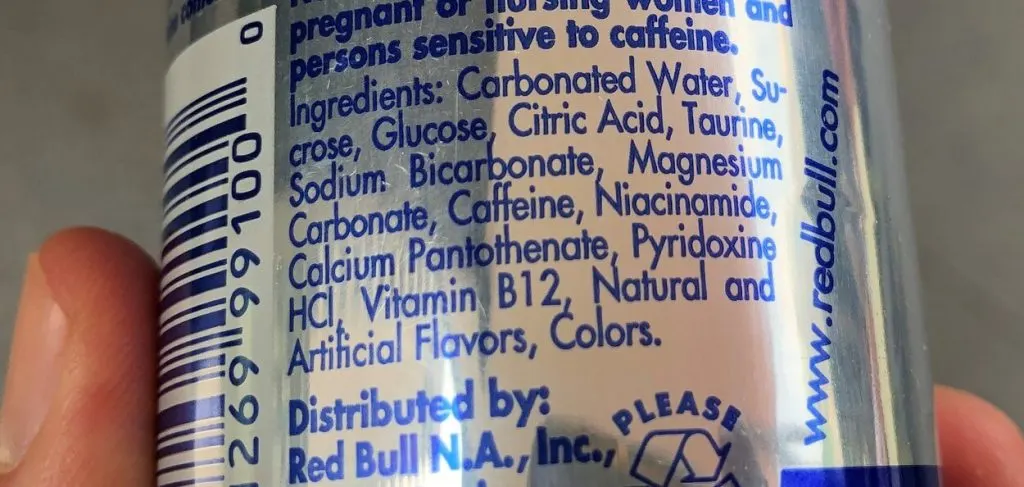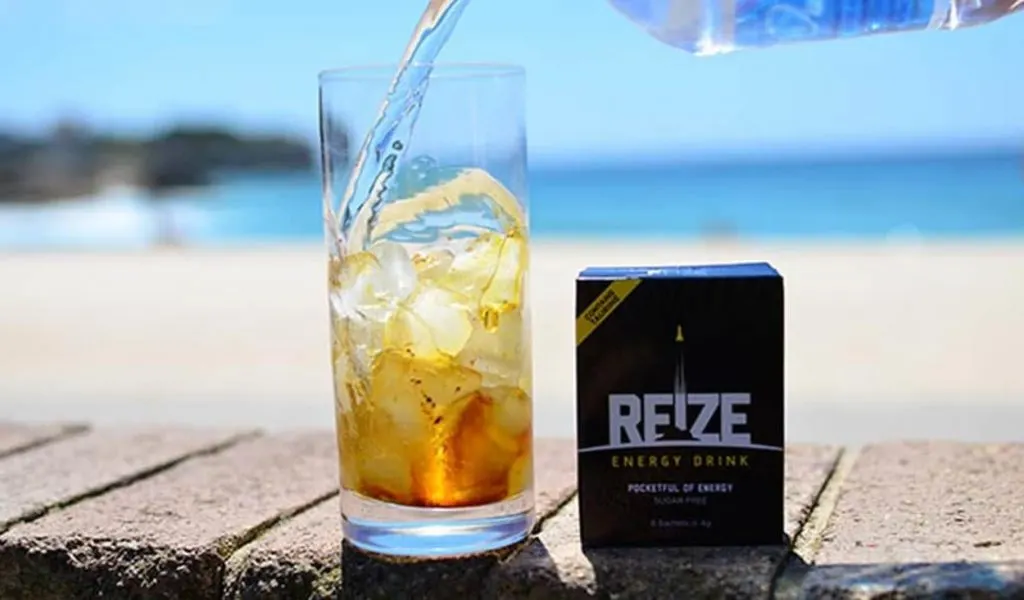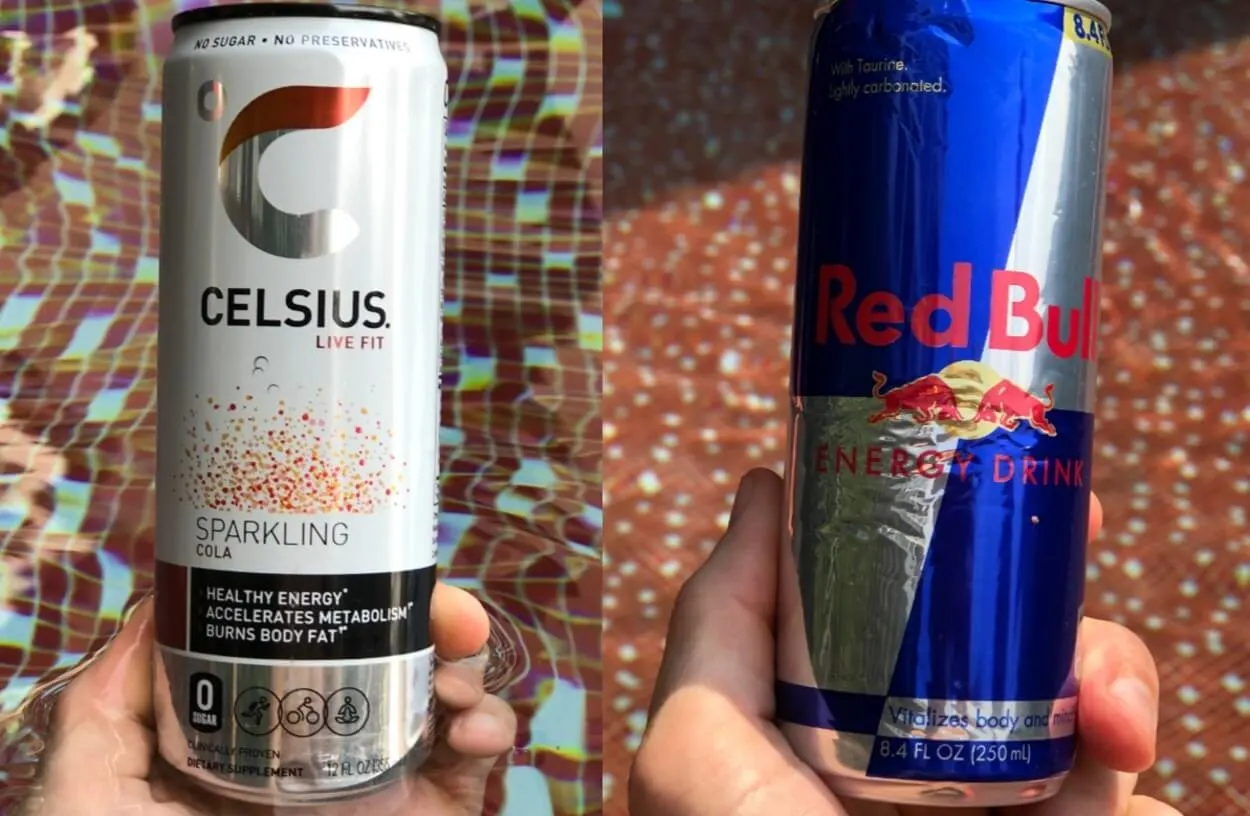Celsius Energy and Red Bull have long-established their presence in the energy drink market for a long time, with Celsius in the fitness and health scene, while Red Bull thrives as a mainstream beverage.
But when these energy drinks are set against one another, you may wonder: which energy drink is better?
In brief, when it comes to Celsius vs Red Bull argument, it really depends on personal preferences and needs, and whether you generally are an active person or not.
For a more in-depth discussion on the pros and cons of each energy drink, and which one is better for you, stick around…
Celsius Energy Drink VS Red Bull Energy Drink Nutrition Facts
First off, let’s compare the nutritional values of Celsius Energy with Red Bull Energy to get an idea of what we’re working with:
| Standard Values | Celsius Energy Drink (per 12 fl.oz) | Red Bull Energy Drink (per 8.4 fl.oz) |
| Energy | 10 calories | 110 calories |
| Protein | – | <1g |
| Fat (Of Which Saturated) | 0g (0g) | 0g (0g) |
| Carbohydrates (Of Which Sugars) | 2g (0g) | 28g (27g) |
| Sodium | 0g | 105mg |
| Caffeine | 200mg | 80mg |
| Vitamin B2 (riboflavin) | 1.7mg | – |
| Vitamin B3 (niacin) | 20mg | 22mg |
| Vitamin B5 (pantothenic acid) | 10mg | – |
| Vitamin B6 (pyridoxine hydrochloride) | 2mg | 5.05mg |
| Vitamin B12 (cyanocobalamin) | 6μg | 5.1μg |
| Vitamin C | 60mg | – |
| Calcium | 50mg | – |
| Chromium | 50μg | – |
| Biotin | 300μg | – |
Celsius Energy VS Red Bull Energy Calories
Celsius Energy contains 10 calories in each 12 fl.oz serving, whereas every 8.4 fl.oz can of Red Bull has 110 calories.
Considering that the recommended daily calorific limit is between 2000 to 2400 calories for women and 2400 to 3000 calories for men, Red Bull contributes more calories to your diet.
Plus, the calories in Red Bull would pile up pretty quickly than the calories in Celsius Energy.
In Celsius’s case, its calorie content won’t heavily impact your overall calorie intake, which makes it a healthier option especially if you’re on a diet or are planning to invest it for extended periods of time.
That said, the calories present in Red Bull do supply you with workable energy to burn off during workouts, which would greatly compliment a more active lifestyle.
In the end, it all boils down to personal choice and the amount of daily activity you engage in. Keep in mind that energy drinks like Red Bull and Celsius aren’t meant to replace healthy meals, so it’s smart to fuel up on real food before hitting the gym.
If you prefer to do away with calories instead, check out my article about the best zero-calorie energy drinks for some great recommendations.
Celsius Energy Drink Ingredients

Celsius offers four product series under its brand:
- Originals (signature Celsius series, includes both carbonated and non-carbonated versions)
- Sweetened with Stevia (naturally sweetened and caffeinated, sparkling varieties available)
- On-The-Go (powdered energy drink)
- HEAT (has a higher dose of caffeine)
Here are lists of ingredients for each of them:
Celsius Originals (12 fl.oz)
- 200mg caffeine
- 60mg vitamin C
- 1.7mg riboflavin (vitamin B2)
- 20mg niacin (vitamin B3)
- 10mg pantothenic acid (vitamin B5)
- 2mg pyridoxine (vitamin B6)
- 300mcg biotin (vitamin B7)
- 6mcg cobalamin (vitamin B12)
- 50mcg chromium
- 50mg calcium
- Carbonated water
- Citric acid
- Fruit & vegetable juices
- Sucralose
- Natural flavor
Celsius Naturals (12 fl.oz)
- 200mg caffeine
- 2g dietary fiber
- 60mg vitamin C
- 1.7mg riboflavin (vitamin B2)
- 20mg niacin (vitamin B3)
- 10mg pantothenic acid (vitamin B5)
- 2mg pyridoxine (vitamin B6)
- 300mcg biotin (vitamin B7)
- 6mcg cobalamin (vitamin B12)
- 51mg calcium
- 50mcg chromium
- 5mg sodium
- Carbonated water
- Erythritol
- Citric acid
- Natural flavor
- Stevia Rebaudiana leaf extract
- Vegetable juice (for color)
Celsius HEAT (12 fl.oz)
- 300mg caffeine
- 60mg vitamin C
- 1.7mg riboflavin (vitamin B2)
- 20mg niacin (vitamin B3)
- 10mg pantothenic acid (vitamin B5)
- 2mg pyridoxine (vitamin B6)
- 300mcg biotin (vitamin B7)
- 6mcg cobalamin (vitamin B12)
- 50mg calcium
- 50mcg chromium
- 2g citrulline
- Carbonated water
- Citric acid
- Natural flavor
- Fruit and vegetable juice
- Sucralose
Celsius On-The-Go (5.9g powder sachet)
- 200mg caffeine
- 60mg vitamin C
- 1.7mg riboflavin (vitamin B2)
- 20mg niacin (vitamin B3)
- 10mg pantothenic acid (vitamin B5)
- 2mg pyridoxine (vitamin B6)
- 300mcg biotin (vitamin B7)
- 6mcg cobalamin (vitamin B12)
- 50mg calcium
- 50mcg chromium
- Citric acid
- Natural flavor
- Sodium bicarbonate
- Sucralose
- Erythritol
- Annato
- Silicon dioxide
All of Celsius’ product varieties contain the Celsius “Metaplus” blend (1.81g), a proprietary energy blend that consists of the following ingredients:
- Taurine
- Guarana
- Caffeine
- Glucuronolactone
- Ginger extract
- Green tea extract
Red Bull Energy Drink Ingredients

A single 8.4 fl.oz can of Red Bull has the following:
- Carbonated Water
- Sucrose
- Glucose
- Citric Acid
- Taurine
- Sodium Bicarbonate
- Magnesium Carbonate
- Caffeine
- Niacinamide
- Calcium Pantothenate
- Pyridoxine HCl
- Vitamin B12
- Natural and artificial flavors
- Colors
For more information on Red Bull’s ingredients, head on over to the Red Bull Nutrition Facts article that I’ve written for a more in-depth discussion.
What’s The Difference Between Celsius And Red Bull?

Caffeine Content
Each 12 fl.oz can of Celsius Energy has 200mg of caffeine, while Red Bull contains 80mg in every 8.4 fl.oz serving.
Caffeine is an important ingredient in energy drinks that supplies you with lots of benefits, from keeping you awake to improving your cognitive functions.
As such, the caffeine content of energy drinks determines the strength of their energy boost and how long these boosts will last.
Concerning Celsius Energy and Red Bull, since Celsius has higher caffeine content, it would produce a stronger energy boost that’ll last for longer periods of time.
Plus, the larger amounts of caffeine in Celsius are justifiable considering that it’s a pre-workout drink specially formulated to enhance physical performance.
Of course, whether Celsius or Red Bull suits your needs or not depends on your caffeine metabolism and how well your body adapts to caffeine.
Celsius would help you out a lot more if you happen to have a high caffeine tolerance or active lifestyle. Meanwhile, Red Bull would deliver a decent boost if your caffeine tolerance is pretty low.
Though, while caffeine may be beneficial, it’s best to consume it in moderation. The FDA recommends a daily caffeine intake of 400mg for healthy adults. Any more than that, and you might end up with adverse effects such as:
- Restlessness and shakiness
- Dizziness
- Headaches
- Anxiety
- Dehydration
- Rapid heart rhythm
In any case, be sure to consume caffeine within a personal tolerable limit, and monitor your daily energy drink intake, as well as your consumption of other caffeinated beverages.
Sugar Content
A single 12 fl.oz can of Celsius Energy has 0g of sugar, whereas each 8.4 fl.oz can of Red Bull contains 27g of sugar.
Since Celsius Energy is completely sugar-free by substituting sugar with sucralose, it’s definitely the healthier alternative if you’re following a diet or reducing your sugar intake. Plus, there’s a smaller likelihood of developing health issues in the future with Celsius as well.
On the other hand, Red Bull has a pretty high sugar content for an energy drink of its size. Granted, the sugar makes Red Bull taste great and lets you indulge in some sugary goodness until the sugar crash hits, that is.
For reference, the AHA instructs a day-by-day sugar intake limit of 25g and 36g of sugar for women and men discretely.
Based on the maximum sugar intake, Red Bull’s sugar content definitely goes over the daily limit, which wouldn’t be healthy for you in the long run.
A diet fairly high in sugar could lead to serious health problems in the long run, like:
- Cardiovascular diseases
- High blood pressure
- Weight gain
- Diabetes
- Acne
Therefore, be sure to monitor your daily sugar intake and try not to overindulge in too many sugary foods and drinks.
If you don’t want to worry about the sugar in your energy drinks, take a look at the article I’ve written on the best energy drinks with less sugar for some lower-calorie recommendations.
Vitamin Content
Celsius Energy shares a number of vitamins with Red Bull, especially vitamins B3, B6, and B12. On the other hand, Celsius Energy contains certain vitamins like vitamin B2, B5, and vitamin C that are absent in Red Bull.
With regard to the number of vitamins in each energy drink, Celsius clearly has a higher vitamin content compared to Red Bull.
If you want to know more about B vitamins and their benefits on your health, Harvard has an interesting article covering the matter.
To make it easier for you to compare the vitamin content of Celsius Energy with Red Bull, I’ve listed the number of vitamins in each energy drink with their functions in a table below:
| Purpose | Celsius Energy Drink (12 fl.oz) | Red Bull Energy Drink (8.4 fl.oz) | Tolerable Upper Intake Level | |
| Vitamin B2 | Generates energy for the body; boosts skin health and eyesight | 1.7mg | – | N/A |
| Vitamin B3 | Helps body release energy; keeps skin healthy. | 20mg | 22mg | 35mg |
| Vitamin B5 | Makes blood cells, and helps to convert food into energy. | 10mg | – | N/A |
| Vitamin B6 | Store energy from protein and carbohydrates; formation of red blood cells | 2mg | 5.05mg | 100mg |
| Vitamin B12 | Releases energy from food; forms red blood cells; keeps the nervous system healthy | 6μg | 5.1μg | – |
| Vitamin C | Controls infections and heals wounds, antioxidant. | 60mg | – | 2000mg |
Celsius Energy VS Red Bull Energy Flavors
Red Bull Flavors
Aside from the Original flavor, Red Bull offers a considerable number of flavors for you to switch over whenever you like. Here are some of the flavors under Red Bull (take note that some of these flavors are only available in specific countries):
- Sugar-free (reduced calories)
- Total Zero (no calories)
- Red (cranberry)
- Ruby/Red (grapefruit)
- Blue (blueberry)
- Yellow/Tropical (tropical fruit)
- Orange/Mandarin (mandarin/orange/orange-kumquat)
- Green/Kiwi (kiwi-apple)
- Purple/Acai (acai berry)
- Lime (lime-lemon)
- Orange Sugar-free (orange)
- Yellow/Tropical Sugar-free (tropical)
- Winter Edition (plum-cinnamon/rumtopf)
- Summer Edition (beach breeze)
Celsius Flavors
Celsius has four product varieties under it, namely Originals, Naturals, On-The-Go, and HEAT. Here are several of the flavors under each Celsius product variety:
Celsius Originals
- Orange
- Grape rush
- Watermelon
- Wildberry
- Kiwi guava
Celsius Naturals
- Grapefruit
- Cucumber lime
- Orange pomegranate
- Watermelon berry
Celsius On-The-Go
- Orange
- Berry
- Coconut
- Cranberry lemon
Celsius HEAT
- Blueberry pomegranate
- Cherry lime
- Inferno punch
- Strawberry dragonfruit
Is Celsius or Red Bull Better?

| Celsius (12 fl.oz) | Red Bull (8.4 fl.oz) | Daily Max Limit (Female/Male) | |
| Calories | 10 calories | 110 calories | 2400 calories/3000 calories |
| Sugar | 0g | 27g | 25g/36g |
| Caffeine | 200mg | 80mg | 400mg |
From a nutritional perspective, Celsius is clearly a better energy drink than Red Bull as it has more nutrients and variety, making it a much healthier option.
Celsius is completely sugar-free and has fewer calories than Red Bull, which helps out a lot with your overall diet and daily calorie intake.
Plus, Celsius contains more vitamins and natural ingredients, which would lead to longer-lasting energy levels and enhanced mental concentration.
Celsius also has more variety than Red Bull, offering four different product series that have varying caffeine content, sweeteners as well as nutrients.
That said, Red Bull has an advantage in terms of a lower caffeine content, which is a bonus if you have a low caffeine metabolism.
Moreover, Red Bull is more suitable for casual purposes, as it can be consumed for any kind of activity, whether it’s studying, gaming, exercising, or staying awake during an afternoon slump.
Ultimately, both Celsius and Red Bull are great choices with unique aspects and benefits, so it really boils down to your preferences and needs as to which energy drink is the best for you.
Have other questions or want to learn more about Celsius? I’ve compiled everything you could possibly want to know about this epic Celsius energy drink guide.
Alternatives To Celsius And Red Bull
If Celsius and Red Bull aren’t to your liking, here are some great alternatives that might appeal to your tastes instead:
Powdered energy drinks make awesome alternatives too, as they’re more convenient and can be personalized according to your preferences:
- Zipfizz
- Advocare Spark
- G Fuel
- REIZE (my fave go-to)
REIZE (10 Out Of 10)

If you’re looking for something with less caffeine and sugar than Celsius and Red Bull, REIZE might be the energy drink for you.
REIZE is a powdered energy drink that is available in light and fits 4g sachets. With a reasonable 50mg of caffeine, REIZE is sugar-free as well and has only 11 calories with each serving.
Plus, REIZE contains a smart blend of beneficial ingredients like taurine, ginseng, and B-group vitamins that work together to provide you the perfect energy boost without the unpleasant sugar crashes.
The best part is that REIZE ships to your home for only around $1 per sachet, which is exceptional value for money.
Give REIZE a try, and you might agree that it’s the smartest option for your daily energy needs.
Other Articles
Have other questions about Red Bull?
I’ve put together this epic Red Bull resource directory where you’ll find everything you could ever want to know about Red Bull energy drink.

